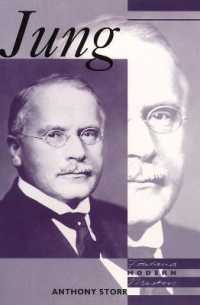Full Description
The book deals with the concept of fragmentation as applied to languages and their documentation. It focuses in particular on the theoretical and methodological consequences of such a fragmentation for the linguistic analysis and interpretation of texts and, hence, for the reconstruction of languages. Furthermore, by adopting an innovative perspective, the book aims to test the application of the concept of fragmentation to languages which are not commonly included in the categories of 'Corpussprache', 'Trümmersprache', and 'Restsprache'. This is the case with diachronic or diatopic varieties — of even well-known languages — which are only attested through a limited corpus of texts as well as with endangered languages. In this latter case, not only is the documentation fragmented, but the very linguistic competence of the speakers, due to the reduction of contexts of language use, interference phenomena with majority languages, and consequent presence of semi-speakers.
Contents
Acknowledgements
List of Figures, Maps, and Tables
Contributors
1 Rethinking Fragmentariness and Reconstruction: An Introduction
Daniele Baglioni and Luca Rigobianco
2 Fragments of Greek in Babylonian
Paola Corò
3 Fragments of 'Solar Royal Compositions' in the Pharaonic Tradition: 'Unterweltsbücher' and Other Related Texts in the Late Egyptian Versions
Emanuele Ciampini
4 'Restsprachen' in Ancient Anatolia: Direct and Indirect Sources, Transmission, and Reconstruction
Stella Merlin, Valerio Pisaniello and Alfredo Rizza
5 Ancient Greek as a Fragmentary Language: What Is 'Alexandrian Greek'?
Federico Favi and Olga Tribulato
6 The Fragmentarily Attested Languages of Pre-Roman Italy: Interpreting, Reconstructing, Classifying
Anna Marinetti and Patrizia Solinas
7 'Restsprachen' and Language Contact: Latin, Etruscan, and the Sabellic Languages
Luca Rigobianco
8 Reconstructing a Language from Fragmentary and Discontinuous Records: Andalusi Romance (So-Called 'Mozarabic')
Marcello Barbato and Laura Minervini
9 Indirectly Attested Dalmatian Romance Varieties: Survey and Perspectives
Nikola Vuletić
10 What Remains of an Atypical 'Restsprache': The Mediterranean Lingua Franca
Daniele Baglioni
11 'Restsprecher' and Hypercharacterizing Informants between Veglia and Capraia
Lorenzo Filipponio
12 On the Translation of the Parable of the Prodigal Son in Mòcheno: Linguistic Analysis and Connection to the Extinct Variety of Vignola
Federica Cognola
13 Semi-Speakers and Data Reliability: The Case of the Cimbrian Variety of Foza
Francesco Zuin
14 Notes on the Morphology and Syntax of a 'Restsprache in Re': Istro-Romanian
Michele Loporcaro
Index







